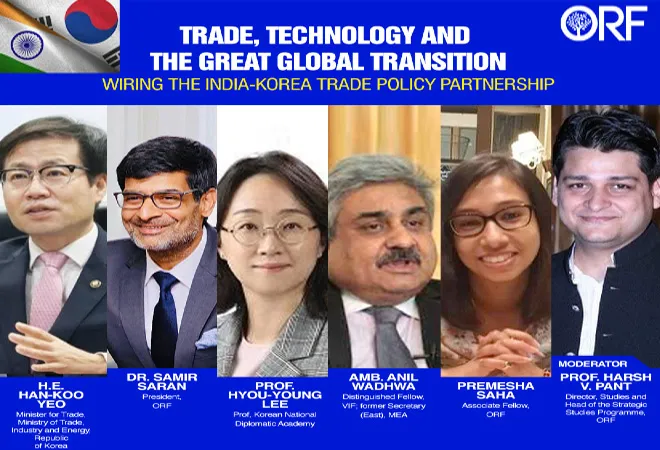-
CENTRES
Progammes & Centres
Location

South Korea has, over the past few decades, turned itself from one of the most poverty affected regions in the 1960’s into one of the world’s premier industrial and technological powerhouses. India, as one of the largest markets for South Korean cars, mobile phones, and tech, has been in a state of economic and strategic renewal since the 1990’s. This has led to an ideal situation for a partnership between the two nations on the economic front, India supplying billions in metals and raw materials, and receiving high quality modern goods, and large sums of investment into the nation by Korean businesses in return. However, the potential for cooperation has only increased, and both nations must work hand-in-hand to fully utilise and realise this potential.
Dr Saran began the discussion by emphasising the importance of revitalising global trade and a renewed focus on ensuring supply chain resilience. keeping in mind the COVID-19 pandemic and its effects on the entire world. While South Korea remains one of the most admired actors in India, Dr Saran pointed out that the full potential of this relationship has not been completely realised. The solution, he opined, is that both nations must work on a robust economic and regulatory framework to fully utilise the opportunities that exist.
Following this, Minister of Trade for South Korea, H.E. Han-Koo Yeo stated the ambitious goals that both nations have set for the future. President Moon-Jae In’s visit to India, Prime Minister Modi’s visit to South Korea and talks on the sidelines of the G20 Osaka Summit have laid the groundwork for growing the partnership between the two Indo-Pacific nations through the creation of a “Future Strategy Group”. Minister Yeo pointed to the seismic shift underway in the global trading landscape. In order to stay true to the vision that both South Korea and India have set for their futures, both powers must scale up their involvement and cooperation in fields such as digital tech, climate change, supply chain diversification, and resilience, labour, public health, and green energy. His Excellency also stressed the synergies prevalent between Korea’s New Southern Policy and India’s Act East Policy, through which both nations seek to expand economic and strategic partnerships throughout the Indo-Pacific. He also expressed a desire for India to join the RCEP framework.
Ambassador Anil Wadhwa brought the Indian government’s perspective to the table and elucidated the many synergies that can be achieved through an expansion of the Korea-India trade relationship. India’s large market and skilled IT population could be a perfect fit for the technological prowess of Korean businesses, which have the skill and technological prowess. He also highlighted the new opportunities presenting themselves in the form of the massive US $1.5 trillion National Infrastructure Plan or the new PLI schemes in the areas of mobile phones, steel, textiles and advanced chemistry. Korea’s technological and research prowess could also be utilised by India in areas such as space, shipbuilding, and nuclear energy, again, sectors that have been recently opened up. Given India’s booming startup ecosystem, Ambassador Wadhwa floated the idea of an India-Korea startup fund that would create a hub for entry into each other’s markets.
Questions of economic security and the “China Challenge” also found their way into the discussion. Professor Hyou-Young Lee emphasised that trade was now interlinked with security, and transparency and confidence was fast becoming a key factor in determining and establishing supply chains. To that end, China has been under tremendous economic pressure due to geopolitical tensions, and India could be the nation to take up its place as an alternative manufacturing hub. In order to achieve this goal, tariff and regulatory barriers need to be smoothed out, and a more robust digital infrastructure needs to be implemented. Professor Lee also put the spotlight on the importance of strong connections to US and EU. While the global pandemic has put global trade on the back foot, it has also meant that powers like India and Korea have the unique opportunity to forge new linkages with other like-minded nations.
Dr Premesha Saha rounded off the discussions with her overview of the broader strategic environment facing India and Korea. She spotlighted the three key ideas of Korea’s New Southern Policy—Diversification, Realignment, and Rebalancing—that are targeted specifically towards South-East Asia and India. In these challenging times when great power rivalries are seeing a resurgence in the world, New Delhi and Seoul have an opportunity to work together for an approach to ASEAN. This could very well serve as a desirable and healthy alternative for ASEAN nations in order for them to avoid getting drawn too far into the tête-à-tête between China and the United States.
The convergences between the New Southern Policy and India’s Act East possibly aligns specifically to South East Asia through relationships with ASEAN nations, which may serve as central to both these ambitious policies. It is important to note that ASEAN nations do not have a unified outlook on the great power rivalries of today, yet will serve as a growing market and economic hub for the Indo-Pacific and therefore, cannot be ignored.
In the words of Minister Yeo, three words describe the current and potential relationship between India and Korea: “Complementary, interconnected, and win-win”. As we enter 2022, a mutual recognition of the benefits of stronger ties has led to representatives embracing the need for infusing a new spirit into this relationship between two great Asian nations.
This event report has been written by ORF intern, Shaumik Roy.
The views expressed above belong to the author(s). ORF research and analyses now available on Telegram! Click here to access our curated content — blogs, longforms and interviews.